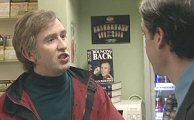Alan Partridge and the Maturity Paradox
Working my way through I’m Alan Patridge some time ago I questioned myself about something. What is it about Bravealan that makes it stand out so clearly as a favorite episode among fans? It’s not significantly funnier than any of the others…nor does it have a complex plot of any kind…what sets it apart?
It didn’t take long before I realized that Bravealan offers the most direct exploration of what makes Alan tick of any episode…and, if you watch closely, it even gives him the chance to transcend the trap that is himself.
Alan Partridge has worn many hats throughout his fictional career. He's been a hospital disc-jockey, a sports reporter, a chat-show host, a presenter for corporate videos, he's written an autobiography, had his own military-based general knowledge quiz show and has even featured in a fly-on-the-wall documentary about his own life. But as varied as his public activities have been, it is impossible to see him in action without being acutely aware of his failings not only as a celebrity, but as a human being.
Which is the main reason that the character works so well. The obviousness of his social shortcomings (obvious to everyone except Alan, that is) dooms him to an eternity of being the butt of his own jokes...a character flaw writer / actor Steve Coogan built into Alan from the very beginning, and one that is perhaps more central to Alan Partridge than any other trait he has acquired or lost through the years.
But what, really, is Alan's hangup? What is it, exactly, that holds him back, that keeps him from progressing from social retardation to social comfort?
As this essay will demonstrate, Alan has two main difficulties in his psychological makeup: loneliness, and immaturity. And though we really only have passing views of them through most of Alan's television appearances, one episode of I'm Alan Partridge series two brings both his loneliness and his immaturity to a peak; and even offers him a bridge to escape both. That bridge is Dan Moody, and that episode is Bravealan.
 |
While it may not seem revolutionary to suggest that Alan suffers from chronic loneliness, it does bear discussion...especially when one takes into account the fact that Alan has had a full career behind him; he's been, to some extent, in the public eye for most of his adult life. He retains connections with many he has met along the way (such as Sue Cook and Bill Oddie). He has children. He has a loyal personal assistant who stands by him through his darkest times. He has fans. He has a girlfriend. And yet, surrounded by these people constantly, Alan is still lonely.
The important distinction here is between loneliness and isolation. Alan is clearly not an isolate; in fact, his life's goal (to return to a full-time career on the television) would make isolationism impossible. Alan does want to be in the public eye; Alan does want to be known and loved. And though one could argue that he is, in fact, known and loved by various people throughout the course of both series of I'm Alan Partridge he is not, by Alan's standards, known and loved by the right people.
Lynn Benfield, Alan's long-suffering PA, is dismissed by Alan very early in the first episode of I'm Alan Partridge. While touring a home Lynn is mistaken for Alan's wife...which Alan corrects immediately.
ALAN: Lynn's not my wife; she's my PA. Hard worker, but there's no affection.
And we are never, at any point, throughout the course of any of the twelve episodes, given a reason to disbelieve that assurance. Coogan ensured that Alan would not give Lynn a moment's respite; which is both courageous on his part (keeping the series consistently dark in respect to the relationship between its two principal characters) and important to the success of the Partridge character (because, obviously, even a minor gesture of appreciation from Alan to Lynn would be interpreted by audiences as a sign of something more significant in Alan's bosom--be it attraction or even just human courtesy--which would diminish Alan's impact).
Lynn is treated very poorly by Alan throughout the course of both series; she is underpaid, overworked, and reminded constantly of her age, homeliness, and, later, her mother's dementia and death. Alan does not let up; if he's one thing, it's consistent.
Alan's other regular companion, Michael, rectifies Alan's friendlessness no more than Lynn does, but he achieves this in a very different way; the simple fact that he is still in Alan's life only serves to amplify Alan's loneliness. Why?
In I'm Alan Partridge series one, Alan is living in the hotel while Michael is employed there as a general sort of handyman, and so the awkward, stilted relationship that develops between them is born more of necessity and proximity than anything else. Yet series two turns all of that on its ear; necessity and proximity are both removed from the equation as Alan no longer lives in the hotel (Michael, irrelevantly, is no longer employed there either) and the proximity vanishes as well: Alan now has to drive to a petrol station if he wants to visit Michael.
Which he does. Constantly. Which means that what could initially be attributed to convenience is now attributed to one simple fact: Alan has nobody else to connect with.
This is not to say that he connects with Michael, either...but Michael at least listens. He allows Alan to talk about himself, ramble about subjects that nobody wants to hear; Michael symbolizes, almost, the audience Alan wishes he still had.
But don't mistake any of this receptiveness on Michael's part for friendship. No, in Never Say Alan Again we learn directly why Michael is so open to Alan's approaches, in the midst of Alan jealously confronting Michael about his other friends.
ALAN: Do you chat to any other men?
MICHAEL: Aye, including you...four regulars, like.
ALAN: Michael, what the hell is going on?
MICHAEL: Well, it's just, you know...men who want someone to talk to. You know. They're just lonely.
Michael has sensed (correctly) that Alan needs somebody to talk to...that nobody in Alan's life is filling the void of friendship. Michael, formerly a hotel handyman and now a petrol station cashier, has taken his "I'm here to help" mentality further than any training manual would have suggested.
Alan's world is populated by many, but the fact that he can call none of them "friend" takes its toll on him, as can be gleaned from just about every conversation (every sycophantic muttering, every boiling detraction) that Alan bungles through during the course of both series.
Which is why the arrival of Dan Moody in Bravealan is significant. Dan's presence makes it clear that Alan is capable of forming connections with people...it's just that there are so few people with whom Alan is willing to connect. Dan Moody sets the ball rolling, and, when he does, Alan (as the episode's title suggests) has the opportunity to be brave, and step forward into a whole new world of social acceptance.
 |
So what does it take to give Alan Partridge a convincing opportunity to actually become friends with somebody? Somebody as self-important, narcissistic and utterly callous as Alan can't just "fall" for any old character believably. What we need, from a writer's standpoint, is somebody exactly like Alan. Which is where Dan Moody comes in (not to mention actor Stephen Mangan who brought Moody to life with a genuine knack for mirroring Alan without impersonating him).
Alan's attraction to Dan is base and shallow, but it's also, somehow, sincere. It's as though Alan has nothing to cling to beyond coincidental details (driving the same car, wearing the same deodorant), but he can tell that there's a connection between them that runs deeper than either of them can see. And he is right; Dan is everything Alan could have been.
He is, for all intents and purposes, the more successful version of Alan Partridge; not Alan Partridge the celebrity, but Alan Partridge the man. They share the same penchant for idiotic banter, childish jokes and bizarre metaphors. They've even (somehow) developed, independently, the same catch-phrase: "That's saaaaad!" There's something here, but Alan, caught up in his own good fortune at meeting somebody so like himself, has only a vague sense of what it might be.
ALAN: It’s amazing, we both like The Daily Mail, we both drive Lexi...
DAN: Plural.
ALAN: Plural. And we both drink Director's Bitter. It’s like The X-Files, but a pleasant X-Files.
DAN: The Lex-Files.
ALAN: God that’s good.
The writers reinforce the fact that these two have much in common, as well they should; it's the key to Dan's character. Without the similarities we would be left with a depressing prospect for Alan, rather than a hopeful one. Consider the following:
Dan Moody is living the life Alan wishes he could. He is suave, handsome, well-liked, married to a beautiful woman, rich and respected. That much is fact.
But if Dan were dissimilar to Alan it would suggest that the reason Dan has everything Alan wishes he could have is the very dissimilarity itself. By crafting both characters to share so many of the same likes and dislikes, the same oddities of speech and gesture, the same outlooks on life, even, we see that Alan can have what he wants, if only he can take a step forward (more on this shortly) from where he is. If Dan were dissimilar, Alan would be doomed. But Dan is very similar and, in that way, a beacon of hope for Alan Partridge.
But what, exactly, is this step that Alan needs to take? It's not enough that Alan assuage his loneliness for a time by meeting a new friend; he needs to make it permanent by overcoming his immaturity.
 |
Now discussing maturity in terms of Alan Partridge (and in terms of this episode specifically) is a bit of a paradox; what is meant by maturity (and what symbolizes maturity) in this episode is the ability to handle and deal with adult situations at a level above that of a child. Let's be blunt: I'm talking about sex.
Alan is in serious trouble.
While he's had sex, of course (and while he continues to do so with girlfriend Sonja) there's never any indication that he enjoys it much...nor is there any indication that he regards it as anything more than a bragging-point. It is here that the distinction between childishness and maturity is made: making love may well be an adult activity, but Alan treats it the way a child might; he's trapped between his own confusion about the act and the voraciousness he believes other people should think he has.
The times we do see Alan initiate sexual contact with Sonja it's clear that he's more focussed on himself than on her ("Come here you lucky, lucky lady.") which reduces the intercourse to, really, an extension of masturbation.
Alan's confusion (and shyness) regarding the sexual act has long been clear in Coogan's portrayal of the character (all the way back, at least, to the second episode of Knowing Me, Knowing You in which, under hypnosis, Alan banishes Ursula Andress from his car for removing her top and demanding he make love to her). He does pursue women, but, much like a flirtatious child, he has no idea what to do with them once he gets them.
The best example of this is in series one, the Alan Attraction episode. Having spent the better part of the day seducing a woman named Jill, Alan manages to get her into bed. Prior to intercourse, Alan wants to switch off the light. Jill asks him to dim it instead, but Alan instead gradually dims the light to total darkness. He's shy about the sexual act; unable to see himself "doing it." (This fact is confirmed in the final episode of series two, when Sonja confides that Alan was, indeed, very shy about making love.)
Once in bed Alan is unable to surrender to the passion; instead he keeps his mouth flapping, uttering as much nonsense as he does in the course of a normal conversation...almost as though he's subconsciously attempting to kill the mood.
ALAN: Do you like me doing that? Shall I do it more quickly or shall I maintain the same speed?
JILL: That's fine.
ALAN: Right. Shall I move on to the other one? Oh, that's lovely. That's first class.
And though Jill manages to keep her libido through Alan's decidedly unsexual sextalk (the pros and cons of the pedestrianization of Norwich City Centre), Alan pulls the plug the moment passion overtakes her.
ALAN: Jill, for God's sake!
JILL: I just thought I'd pour chocolate mousse over you.
ALAN: You've got it on the bedsheets, you've got it on my dressing gown, you've got it on the valance...
JILL: The what?
ALAN: The skirting thing round the side of the bed!
It's uncertain what, exactly, sex is for Alan...but it's certainly not what it is for the healthy male mind. Alan seems to suffer from a fear of intercourse that prevents him from treating it as pleasurably as everybody else seems to. In a deleted scene from series two, it seems that a similar event may have happened with Sonja.
ALAN: She’s a bit weird, but she makes up for it. So we were bonking like mad the other night. Yeah, she was making a heck of a din. I said to her, “Unless you reduce the noise levels you will have to leave.” And she complied. What a lady.
Even sex with Carol, his ex-wife, doesn't seem to have been a very pleasurable experience for Alan; he remembers more about the circumstances surrounding Fernando's (his son's) conception than the act itself. In fact, the very conversation that includes details of Fernando's conception begins with some very strange fatherly advice:
ALAN: Fernando, you're twenty-two years old and you're spending Saturday afternoon in bed with a girl. You're wasting your life.
Oddly enough, further support of Alan's stunted sexuality comes from Digital Dave, the computerized interviewer from the Anglian Lives special.
DIGITAL DAVE: Do you have a favorite uncle?
ALAN: Did I have a favorite uncle? Yes I did. Uncle Harry. He died last year a virgin.
And that's the only detail we hear of Alan's favorite uncle. A very strange moment, to be sure, but when taken along with the previous examples of Alan's sexual reluctance, it's just another detail to cement the truth.
So if this stunted sexuality is Alan's immaturity, what, exactly, would maturity be? A healthy outlook on sex? Perhaps a simple exercise in the pleasures of coitus?
Not exactly.
 |
Dan Moody, as we've seen, is Alan's mirror-image in every way but one: success. But there's a darker smudge on that mirror than we might earlier have thought.
Dan and his wife Ceri are sexpeople. Swingers. Sex swappers. And, on top of that, they videotape their escapades and show those videos to people, such as Alan and Lynn, that they don't know very well. If Alan is sexually reluctant, Dan is sexually extroverted...and this is the line that Alan must cross to join his more successful double. If he is to hold on to his friendship with Dan (who, until now, has given him nothing else to dislike) he is going to have to cross over...he is going to have to shed his fear of the sexual act; he is going to have to mature.
Of course, Alan cannot do this; his frustration is too deeply rooted for him to overcome, and the idea of sleeping with another man's wife (presumably while being videotaped) sends his Puritanical ideas of sex into an uproar. So afraid of maturing is he that he will lose his friend...his best friend...rather than step up, take a deep breath, and become a man.
Alan has been offered his chance to advance, his chance to break free of both loneliness and immaturity, and he has failed.
Or has he?
The final scene in the episode features Alan broadcasting his radio program, specifically a segment entitled "Alan's Deep Bath," which is sensual in nature but, before his viewing of Dan's videotape, was a harmless exercise in radio fun only.
However Dan's advances on Alan have shocked him into full sexually-restricted mode again, and he ends his "Deep Bath" series with an unabashedly unromantic sentiment...
ALAN: That’s the last one. We’re stopping this after tonight. So there’s the bath, hop in, wash yourself. [...] Do be clean. There’s a big coarse towel on the radiator, and don’t forget to rinse the bath after you drain the water; use the shower nozzle to rinse off the scum.
Dan and Ceri are listening at home, and Alan has done something significant here: he's made a stand. "Do be clean," he advises his listeners, and, following a night of near-swinging, this takes on additional meaning...as does his recommendation of "rins[ing] off the scum." Alan's preaching here his own values; something the character has never been able to do before, and whether you disagree with his moral, whether it was misplaced or even selfish, Alan stood up for himself...and that was the "brave" thing to do. Meeting Dan Moody was a turning point for Alan Partridge after all, though not the one that might have been expected.
Alan then plays us out with Brian and Michael's Matchstalk Men and Matchstalk Cats and Dogs, a carefree acoustic number celebrating childish imagery with even a group of children singing the chorus. What better paean to immaturity than that?
The song plays over scenes of Alan playing video games with a young boy...though not in any sort of bonding manner (which would imply adulthood on one end and childishness on the other), but in the spirit of true competition (which represents childishness on both sides). Alan smiles as he remembers his romp through the arcade, and even declares himself "King of Anglia." It's the happiest thing that comes to mind: a complete abandon of the adult world, with all of its business transactions, contracts, alliances, sexpeople and betrayals.
There is no doubt that Alan would shed his loneliness should the chance arrive, but not at the expense of the immaturity which has proved to be his most powerful defense mechanism after all.
About this entry
- By Phil Reed
- Posted on Saturday, June 16 2007 @ 11:50 pm
- Categorised in TV, Analysis
- Tagged with alan partridge
- 2 comments

I really love this article; it nails Partridge's personality faults, but actually makes the reasonable point that Alan does at least have the strength not to go along with something that makes him feel uncomfortable.
By Tanya Jones
June 18, 2007 @ 5:07 pm
reply / #
I think the fullest exploration of what makes Alan tick is that first series episode where he's bored and sings Goldfinger and dresses up as a zombie, but there's a lot of overlap thematically between the two episodes. Great article, anyway.
By Michael Lacey
June 18, 2007 @ 6:27 pm
reply / #